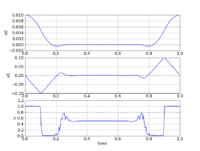Difference between revisions of "Fuller's problem"
JonasSchulze (Talk | contribs) m (Text replacement - "<bibreferences/>" to "<biblist />") |
JonasSchulze (Talk | contribs) m (Text replacement - "\<bibref\>(.*)\<\/bibref\>" to "<bib id="$1" />") |
||
| Line 6: | Line 6: | ||
}} | }} | ||
| − | The first control problem with an optimal [[:Category:Chattering|chattering]] solution was given by < | + | The first control problem with an optimal [[:Category:Chattering|chattering]] solution was given by <bib id="Fuller1963" />. An optimal trajectory does exist for all initial and terminal values in a vicinity of the origin. As Fuller showed, this optimal trajectory contains a bang-bang control function that switches infinitely often. |
The mathematical equations form a small-scale [[:Category:ODE model|ODE model]]. The interior point equality conditions fix initial and terminal values of the differential states. | The mathematical equations form a small-scale [[:Category:ODE model|ODE model]]. The interior point equality conditions fix initial and terminal values of the differential states. | ||
| Line 57: | Line 57: | ||
== Miscellaneous and further reading == | == Miscellaneous and further reading == | ||
| − | An extensive analytical investigation of this problem and a discussion of the ubiquity of Fuller's problem can be found in < | + | An extensive analytical investigation of this problem and a discussion of the ubiquity of Fuller's problem can be found in <bib id="Zelikin1994" />, a recent investigation of chattering controls in relay feedback systems in <bib id="Johansson2002" />. |
== References == | == References == | ||
Revision as of 22:32, 30 December 2015
| Fuller's problem | |
|---|---|
| State dimension: | 1 |
| Differential states: | 2 |
| Discrete control functions: | 1 |
| Interior point equalities: | 4 |
The first control problem with an optimal chattering solution was given by [Fuller1963]Author: A.T. Fuller
Journal: Journal of Electronics and Control
Pages: 63--71
Title: Study of an optimum nonlinear control system
Volume: 15
Year: 1963 . An optimal trajectory does exist for all initial and terminal values in a vicinity of the origin. As Fuller showed, this optimal trajectory contains a bang-bang control function that switches infinitely often.
. An optimal trajectory does exist for all initial and terminal values in a vicinity of the origin. As Fuller showed, this optimal trajectory contains a bang-bang control function that switches infinitely often.
The mathematical equations form a small-scale ODE model. The interior point equality conditions fix initial and terminal values of the differential states.
Contents
[hide]Mathematical formulation
For ![t \in [t_0, t_f]](https://mintoc.de/images/math/5/5/8/55823791d9100bcb5461801aff4f6edd.png) almost everywhere the mixed-integer optimal control problem is given by
almost everywhere the mixed-integer optimal control problem is given by
![\begin{array}{llcl}
\displaystyle \min_{x, w} & \int_{0}^{1} x_0^2 \; \mathrm{d} t \\[1.5ex]
\mbox{s.t.} & \dot{x}_0(t) & = & x_1(t), \\
& \dot{x}_1(t) & = & 1 - 2 \; w(t), \\[1.5ex]
& x(0) &=& x_S, \\
& x(t_f) &=& x_T, \\
& w(t) &\in& \{0, 1\}.
\end{array}](https://mintoc.de/images/math/b/c/8/bc817f0912abd1c57882137cc7ea7a5d.png)
Parameters
We use  .
.
Reference Solutions
Solutions obtained with optimica
The solution found for the relaxed Fuller's problem with optimica using the solver Ipopt (with the linear solver MA27) is obtained with 12 iterations and the objective is 1.5296058259296967e-05.
Source Code
Miscellaneous and further reading
An extensive analytical investigation of this problem and a discussion of the ubiquity of Fuller's problem can be found in [Zelikin1994]Address: Basel Boston Berlin
Author: Zelikin, M.I.; Borisov, V.F.
Publisher: Birkh\"auser
Title: Theory of chattering control with applications to astronautics, robotics, economics and engineering
Year: 1994 , a recent investigation of chattering controls in relay feedback systems in [Johansson2002]Author: K.H. Johansson; Barabanov, A.E.; Astr\"om, K.J.
, a recent investigation of chattering controls in relay feedback systems in [Johansson2002]Author: K.H. Johansson; Barabanov, A.E.; Astr\"om, K.J.
Journal: IEEE Transactions on Automatic Control
Number: 9
Pages: 1414--1423
Title: Limit Cycles with Chattering in Relay Feedback Systems
Volume: 47
Year: 2002 .
.
References
There were no citations found in the article.
